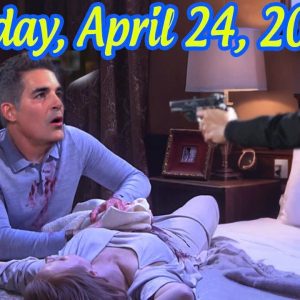Tension mounts in Walford as Nigel’s condition begins to deteriorate before the eyes of his loved ones. The signs are no longer subtle. His once-sharp mind is becoming clouded, his confidence shaken, and now—he’s starting to lose his grasp on reality altogether.
After a frightening incident, Nigel is rushed to the hospital. The staff suspect he may have been mugged, but when questioned, Nigel insists that he simply fell. His tone is desperate—almost pleading—not to be questioned further. But his words, “please don’t hurt me again,” hint at something deeper, something more troubling than a mere fall.
Worried for his safety, his family presses him for the truth. Where was he going? What was he thinking? He finally opens up—vaguely. After speaking with Jean, something clicked in him. He felt the weight of his reality settling in and had made plans to escape to a rented park home near the coast. His hope? That being somewhere familiar might revive the fading fragments of his memory. That the sea air and peace might slow the inevitable descent into confusion.
He speaks with quiet fear about the rising reports of dementia and brain injuries, wondering aloud whether his recent head injury could be accelerating his decline. The doctors haven’t confirmed anything—but in his heart, Nigel feels something has shifted. And not for the better.
Meanwhile, the tension between him and his loved one—possibly his caregiver or partner—reaches a boiling point. When Nigel insists on returning to the house by the sea, he’s met with resistance. The door has been locked. The keys hidden. “You don’t need to go there anymore,” he’s told gently—but firmly.

Nigel’s voice rises with panic. “You’re doing the one thing I fear the most… taking away my choices.” He reveals he’d been giving himself regular cognitive tests—his own little method of checking whether he was still him. He’d just failed one. And for him, that meant everything. It was his trigger, his promise to himself: act now, while he still could.
His loved one tries to ground him. “You’ve just had a blow to the head. You’re confused. You’re scared.” But Nigel, through tears and frustration, cries out the truth he now believes: “Something has changed. Something inside me.”
His words hit like a punch to the chest. “In a week, maybe a month… I might not remember. I might not even care. But I care now. And I want this version of me—the me I still recognize—to make the decisions.”
He speaks from a place of heartbreaking clarity. He’s lived a life of purpose. He fought his father’s control, he made money, he took care of his mum. He had meaning. Now, those anchors are gone. All he has left is now—and the chance to choose how this part of his journey will be written.
The other character—pained but composed—softens. Their voice wavers as they promise Nigel that if he stays, he’ll be looked after. Not like a prisoner. But with dignity. With love. “This isn’t about saving you, Nigel,” they whisper. “It’s about saving both of us.”
And there it is. A quiet plea wrapped in loyalty. If Nigel commits to staying—right here, in Walford—then they will commit to standing by him. Through the confusion, through the pain, through the eventual forgetting. All the way to the end.
But the question now hangs heavy: is it already too late?
What started as a concern has become a full-blown crisis. Nigel’s fall might have been more than just a stumble—it may have been a turning point. A devastating acceleration of a condition that he’s been trying to outrun. But no matter how far he tries to go, the shadows of his illness keep catching up.
The storyline is not just about memory loss—it’s about dignity, identity, and the terrifying prospect of losing control over one’s own life. And in Walford, where family secrets and raw emotions are always simmering just beneath the surface, this journey is only beginning.
Viewers are left with a swirl of questions: Can Nigel maintain agency over his life as his symptoms progress? Will his loved ones respect his wishes, even when they clash with their instinct to protect? And what happens when the one person who knows they’re slipping is the one trying hardest to hold on?
As the days grow darker in Walford, this emotional rollercoaster promises to be one of EastEnders’ most heartbreaking arcs yet.





